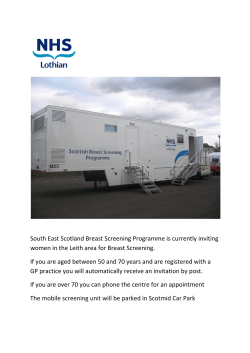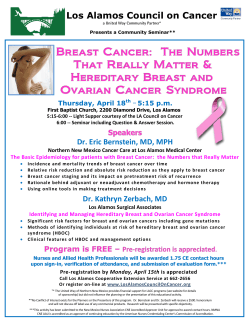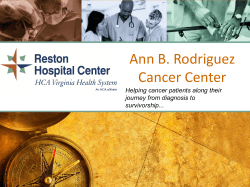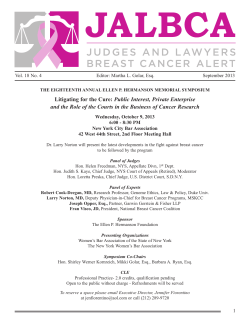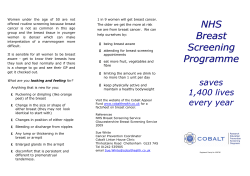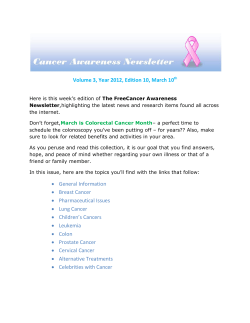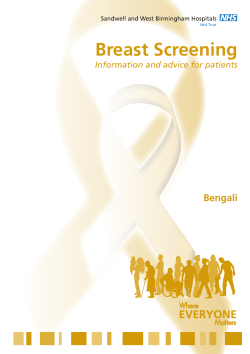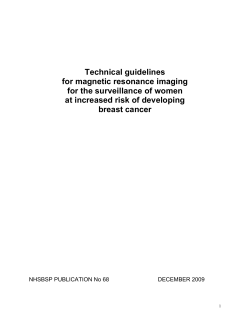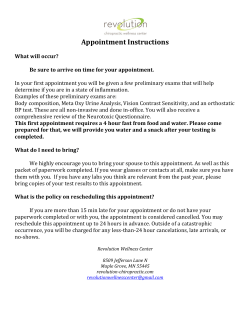
Five things you need to know about the Leeds About Pacesetters
Five things you need to know about the Leeds Breast Screening Service: 1 2 3 4 5 The Leeds Breast Screening Service has female staff. You can take someone with you to help or ask for an interpreter before your appointment. The test is quick and it can be uncomfortable but this doesn’t last long. You can still make an appointment for screening even if you have missed appointments in the past. You can still have a breast screening if you are over 70. To make an appointment ring the Leeds Breast Screening Service on 0113 2063816. Breast Cancer Symptoms Know what to look and feel for How they look. Any change in the outline or shape of the breast, such as those caused by either lifting your arms above your head or by lifting the breasts. Any puckering or dimpling of the skin. How they feel. Discomfort or pain in one breast that is different from normal, particularly if new and persistent. Are there any lumps? Any lumps, thickening or bumpy areas in one breast or armpit which seem to be different from the same part of the other breast and armpit. This is very important if new. Are there changes to your nipples? Nipple discharge, new for you and not milky. Bleeding or moist reddish areas which don’t heal easily. Any change in nipple position - pulled in or pointing differently. A nipple rash on or around the nipple. About Pacesetters Pacesetters is a partnership between the Department of Health, the local NHS and communities who experience health inequalities. The aim of the programme is to ensure that; patients, service users, staff and communities are involved in the design and delivery of services; and health inequalities are reduced for patients and service users. 1 in 9 women get breast cancer About NHS Leeds NHS Leeds is responsible for ensuring that the people of Leeds have access to the healthcare services they need. The organisation works with the local hospitals, mental health trust, community-based services and GPs, pharmacists and opticians to make sure services are available across Leeds. For more information visit www.leeds.nhs.uk About Touchstone Touchstone is a local organisation that works in partnership with service users, carers, organisations and communities to provide high quality services that improve the health and wellbeing of local people NHS Leeds, Touchstone and Pacesetters have been working closely to improve health information and access to services like breast screening. For more information about Touchstone visit www.touchstone-leeds.co.uk Breast Screening Programme The NHS Breast Screening Programme provides free breast screening every three years for all women in the UK aged 50 and over. Around one-and-a-half million women are screened in the UK each year. The NHS Breast Screening Programme will extend the age range of women eligible for breast screening to ages 47 to 73 between 2010 and 2012. With thanks to: Shantona women’s centre and the women of Harehills and Chapel Allerton for their help in developing this leaflet. A partnership project between NHS Leeds, Touchstone and Pacesetters. If you have been invited for breast screening please make sure you go. Breast screening could save your life. Breast cancer can be treated if signs are spotted early. If you have recently missed your last breast screening appointment please contact the Leeds Breast Screening Service on 0113 2063816. You can also ring the breast screening unit and ask for an interpreter to be at your appointment but please give 2 weeks notice. Hindi Bengali What happens at a breast screening? Your invitation letter All women aged 50 to 70 who are registered with a GP will receive an invitation letter for a breast screening. The first invitation will arrive some time between your 50th and 53rd birthday. In the future women aged 47 to 73 will be invited for screening. When you receive your invitation letter you can change your appointment if it isn’t convenient. You can also ring the breast screening unit and ask for an interpreter to be at your appointment. When you arrive Punjabi Urdu When you arrive you will be met by a receptionist who will ask you for your name, address and date of birth. You can take this information with you. If your appointment is at one of the hospitals and you have brought someone with you, they will be able to sit in the waiting area with you. There is not much room on a mobile unit so if you take someone with you they may be asked to wait outside while you have the test. Getting changed If you are at a static breast screening clinic in hospital you may be taken to a changing room and asked to change into a gown. You will then be asked to take a seat in the waiting room. Alternatively you may be asked to remove the top half of your clothing in the X-ray room instead of changing into a gown. On a mobile unit you will be taken straight through to the changing cubicle and asked to remove to the top half of your clothing. The test The test is called a mammogram. It is a kind of X-ray that lets specialists see inside your breasts for any lumps or changes. The test can be uncomfortable and in some cases a little painful but it only lasts for a few minutes. Each breast is put in the machine and pressed down by the equipment to keep it still while the X-ray is taken. Your results The person who looks at your mammogram (X-ray) is called a radiologist. They will look to see if there is anything that might need further testing. You and your GP will both get a letter telling you the result of your test within two weeks. When you receive your results, you may be asked to go to an assessment clinic where more tests can be carried out. There are a number of different tests that might be carried out to find out if you need treatment. If you do not need further tests or treatment you will be invited for another mammogram within three years. Treatment If breast cancer is found early, it can be treated successfully; more and more women are surviving breast cancer each year thanks to new medicines and technology.
© Copyright 2025
